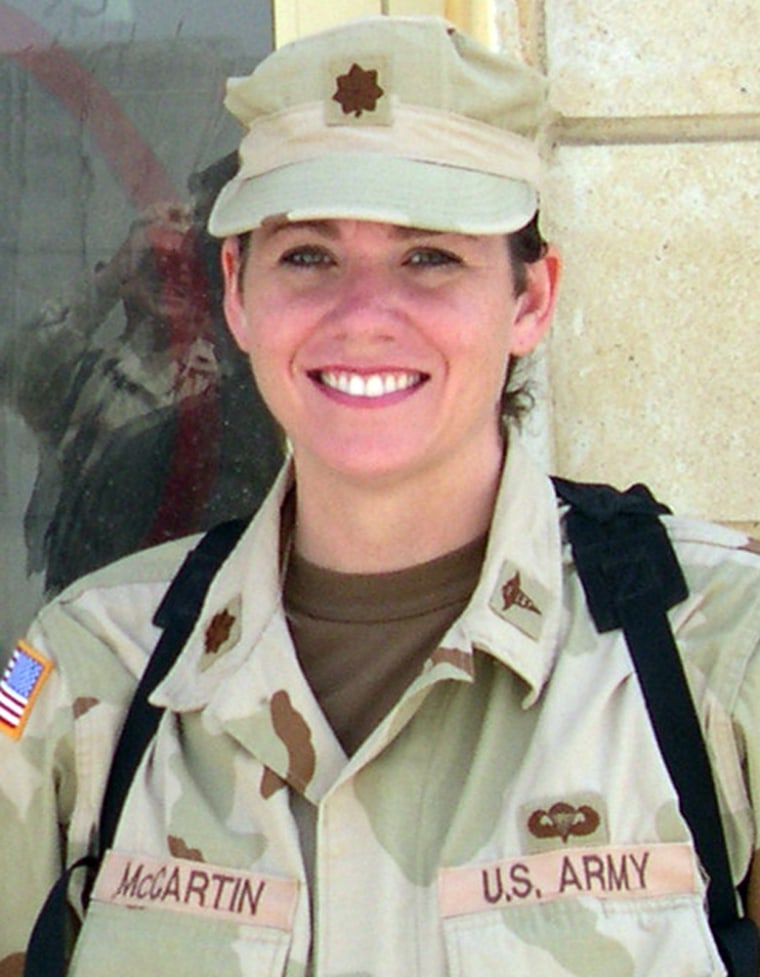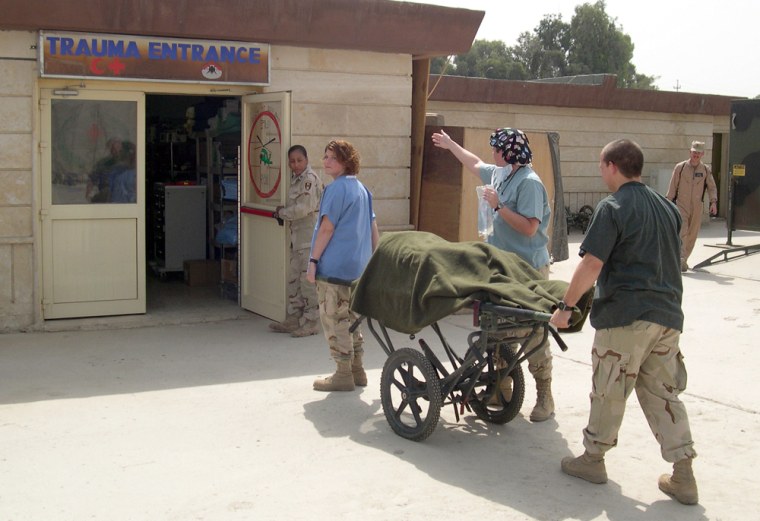It was 3 a.m. when Dr. Tamarin McCartin’s pager went off. Three severely injured children, the survivors of an Iraqi family ripped apart by mortar fire the prior evening, had been driven around the dangerous, post-curfew Iraqi night by their teen-aged brother for more than seven hours in search of urgent medical help. Eventually, having been turned away from several facilities and the Syrian border, the boy convinced an American unit to break Army regulations and arrange helicopter transport to the U.S. Army’s 228th Combat Support Hospital in Mosul for his dying siblings.
“The three children that were here were a 14-year-old girl, a 12-year-old boy and a 7- or 8-year-old boy,” says McCartin. “I took care of the girl because at the time I was the only female physician in our [hospital].”
The girl was awake but strangely quiet, perhaps because she had seen her father and a brother blown to pieces earlier that night, McCartin says. Metal shards studded the back of her legs, back and buttocks, and one large piece lodged dangerously close to her bowel. She also had a broken back. After hours of surgery, the girl was stabilized. The two boys, injured even more extensively, also survived surgery, and within a few days all three had been transferred to an Iraqi children’s hospital in Mosul.
“As far as I know, they all lived,” McCartin says. But, like so many things in Iraq, there is no way to be sure.
Deploying obstetricians and pediatricians
An obstetric gynecologist from Honolulu, this is hardly the life Tamarin McCartin had foreseen when she elected to go to medical school on an Army scholarship. She and her husband, another Army OB/GYN, practice at Tripler Army Medical Center on Oahu, a great pink wedding cake of a hospital with Pacific vistas that is one of the most sought after postings in the U.S. military.
“This is very unlike anything I do at my job at Tripler,” says the doctor, who deployed to Mosul in June and spoke with MSNBC.com via email. “All of the surgery and trauma I’ve done with the exception of one teen-aged Iraqi girl has been on men, and has ranged from chest tubes, central lines and orthopedic procedures like skin grafts and wound care.”
McCartin is hardly alone. Throughout the vast Army Medical Command, an agency with a budget of $9.7 billion in 2005, doctors, dentists, physicians' assistants, lab technicians and nurses on active duty in the reserves or National Guard, are finding themselves opening old notebooks and straining to remember things they have not done since their medical residencies. The wars in Iraq and Afghanistan have created an urgent appetite for battlefield medical specialists. The situation is much the same at the Navy’s Bureau of Medicine and Surgery, which handles Marine Corps casualties, and the Air Force’s system.
“Frankly we’ve had a large number of pediatricians deploying as battalion surgeons,” says Lt. Gen. Kevin Kiley, the Surgeon General of the Army. “We would like all of our physicians to deploy and serve in combat ops. It may not be what they did in peacetime, but all of them know that the Army’s main job is saving the lives of our soldiers.”
One of those pediatricians is Dr. Charles Garbarino, a neo-natal specialist who practices in West Orange, N.J. – about 13 miles from New York City. Dressed in a blue jean shirt emblazoned with the characters of A.A. Milne’s colorful Winnie the Pooh, Dr. Charlie, as he likes to be called by his diminutive patients, seems anything but battle ready. But he, too, is heading for the front, starting his second tour in as many years on August 11 in Southwest Asia.
“I’m scared out of my wits,” he says as his wife, Lydia, listens nearby. “Reality is setting in. I went out and bought a holster for my sidearm this weekend. But I’m also planning to bring a lot of lollypops and spend time in Iraqi clinics with their children. If you can make even a little bit of a difference, I think you should. But in the end, I do it for the soldiers.”
'I was lucky the first time'
Unlike McCartin, Garbarino is not on active duty but is a member of the New Jersey’s National Guard – a former state surgeon general, in fact. Back in November 2003, he received a request for three National Guard doctors from the state – a physician and two dentists – who could be deployed immediately. He chose two dentists and himself.
“I was lucky the first time, I ended up in Kuwait,” he says. “This time, there’s going to be a lot more risk, because I’m heading to Kirkuk,” a northern Iraqi city on the edge of the violent “Sunni Triangle.” Garbarino will serve as the medical officer for 500 soldiers of the 116th Cavalry Brigade made up of Guard units from the Pacific Northwest.
In spite of his day-to-day concentration on childhood vaccinations and pre-mature babies, Garbarino dismisses the idea that his specialty is incompatible with combat wounds. “Adults are really just big children when you’re talking about anatomy,” he says, adding that his status as a trainer in the Guard’s Trauma Life Support program gives him an additional edge.
While some civilians may wonder at the thought of their family dermatologist being posted in Iraq, doctors and military medical officials insist that an American physician’s specialty is not really the issue.
“Your specialty may be the area where you are most knowledgeable, but American-trained physicians all have a complete medical education, so these people are well qualified to provide medical care and deal with combat injuries,” says Dr. Sue Bailey, a former assistant secretary of defense for health. “
“I used to say, ‘We’re the HMO that goes to war’,” says Bailey, who headed the military’s health care service in the late 1990s and is now an NBC News analyst. “We were prepared for the fact that we’d have to take people out of any area when we needed them and deploy them. Then we’d backfill their jobs stateside with reservists or even contract some services out.”
Since 9/11, the military has done that quite a bit as successive wars put new demands on what, since the end of the Vietnam War, had become essentially a universal health plan for U.S. military families.
“The mission of Army Medical Command – and it’s the same for the Navy and Air Force – is bigger than just combat medicine treatment,” says Kiley, the Army's surgeon general. “The peacetime and home front health services we provide for service personnel and their families are one of the Army’s most valuable benefits.” About $8.6 billion of the 2005 budget of $9.7 billion, according to Army figures, went to providing care to soldiers and their families. About 20 percent of that figure, or about $2 billion, paid for contracts with other providers and a variety of other services.

Back in Iraq, McCartin’s thoughts are on more abstract concerns. “My husband is what I miss most,” she says. “My family and friends rank right up there, but I can’t wait to stand at the edge of the beach with my feet in the water holding my husband’s hand and smelling that sweet Hawaiian air.”
In the meanwhile, she has two more months, at least, of trauma care, and while she says that there is the occasionally terribly wounded soldier, most of the casualties – “90 percent of our patients are Iraqis.”
“I never realized the toll and psychological burden that fear must have on people in this state. At least there will be an end to it for me once this deployment is over. There is no light for the Iraqi people of Mosul and other similar areas,” she says. “There’s no day of reckoning or time when they can say, ‘If only my family and I can make it until …”
